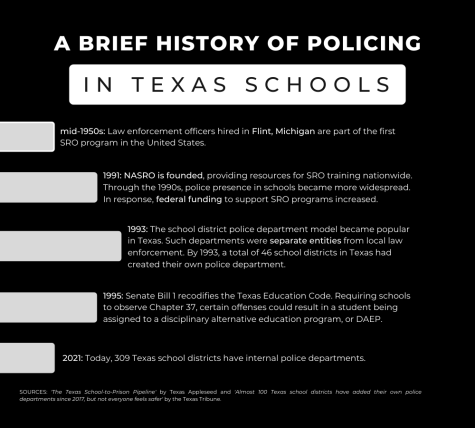Challenging the rhetoric on school policing
July 28, 2022
Significant reorganization of district administrative structures in November 2019 placed Behavioral Health Services under the Safety and Security Department, later followed up by a $1.17 million spending addition in August 2020 that was allocated towards hiring ten social workers to serve as district employees and five under contract. Two social workers were assigned to each vertical learning community, which comprises the five high school campuses and their immediate feeder patterns.

The current policing framework as such, takes on a “four-pillar approach” that focuses on “safety and security, equity, behavioral health, and student advocacy.” Westwood social worker Ms. Eden Males expressed appreciation for the consistency of district commitment to building a holistic understanding of student needs beyond academics.
“We work really closely with the police officers to make sure that we’re doing the best we can as a team,” Males said. “We usually do collaborate, especially if there is a potential for there to be a mental health or behavioral component to it, just to see how we can better support the student and the family in navigating that.”
As clarified by RRISD, using the term ‘behavioral health’ is preferred in reference to both “mental health and substance use treatment and services.” Employing a multitude of perspectives that aid in providing specialized support for student emotional and physical wellbeing, a social worker’s role on campus transcends the responsibilities attached solely to crisis de-escalation. Approaches that consider the multicausality of the circumstances contributing to student behavior can offer a perceptive value in larger discussion of gun violence prevention in schools.
“When we look at the individual as social workers, we’re looking at them from a biopsychosocial model,” Males said. “So that’s looking at things biologically [and] psychologically, [with respect to] their thoughts, emotions, behavior, and then also that social component, [including] their socioeconomic status, socio-environmental [factors], and cultural dynamics.”
Males cites the commitment to relationship-building with students as a key facet of success prioritized in the model, a step many times led by the police officers themselves before involving campus social workers in particular cases. Additionally, all officers complete mental health training in conjunction with their work alongside licensed professionals.
“Having those different perspectives with such a sensitive topic is so important,” Males said. “We need that multidisciplinary approach [when] looking at individual educational backgrounds differently to make sure we’re not missing anything and doing everything we can to support our learning community.”
The sustainability of measures taken to mend disciplinary systems perpetuating exclusionary practices among students of color continue to raise questions on the very nature of policing in schools and the glaring disparities that plague progression towards equitable learning.
“As a department, we focus on what we can do to collaborate to reduce that school to prison pipeline,” Males said. “Speaking to increased police presence, I think any increased student support on campus is something that we can all benefit from.”
